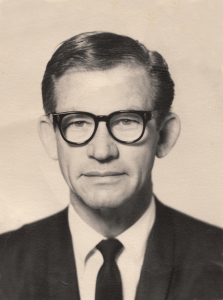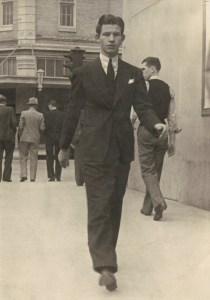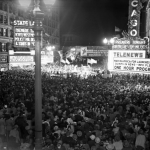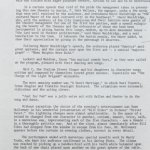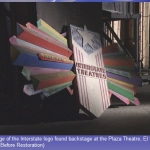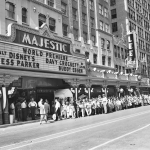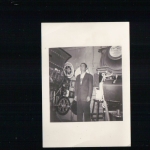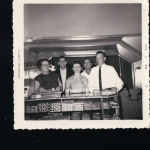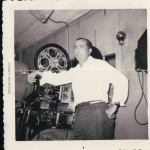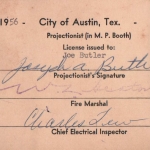Interstate Theatres
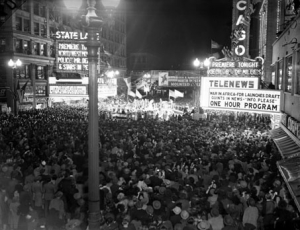
Karl Hoblitzelle
INTERSTATE THEATRE CIRCUIT
“In his own way Karl Hoblitzelle has been an empire-builder-and his is a prouder achievement than the empires that have risen and fallen since 1906 for his is built not on the forces that divide men, but on the ideals which unite them.” –Cecil B. DeMille
Origins
Karl Hoblitzelle (1879-1967) was a self-proclaimed “pioneer” in vaudeville and motion picture entertainment in the South. He got his start in the entertainment business at the 1904 Louisiana Purchase Exposition (alternately, St. Louis World’s Fair), where he rose from office boy to acting director in charge of demolition within the period of four years. Shortly after the close of the Louisiana Purchase Exposition, a group of concessionaires approached Hoblitzelle and his brother George to invest in a prospect to build a group of vaudeville theatres in the South, which was basically bereft of theatres at that time. The Hoblitzelles invested $2,500 to open Interstate Amusement Company in 1905, whose first theatres included the Dallas, Fort Worth and Waco Majestic Theatres and the San Antonio Empire Theatre. In the beginning, Hoblitzelle considered Interstate Amusement Company a mere investment and had no intention of managing it himself, but because of the other investors’ inability to effectively run the company, he assumed the position of president in early 1906.
The early years
In in its early period (1905-1920), Interstate was principally a vaudeville booking and exhibition company with theatres in Texas, Mississippi, Louisiana, and Arkansas. The South was slow to accept vaudeville as a legitimate form of entertainment; such theatre was often characterized as a “Gateway to Hell” in the popular media of the time. Interstate is frequently credited with removing the stigma from theatre going and turning the theatre into a center of family-oriented civic and community activity. As Hoblitzelle tells it,
It was a heart breaking job to convince the good people of Texas in those early days that we were
presenting only clean, wholesome entertainment. A good many of the men connected with the
theatre of that day occupied questionable positions in the community. They had graduated out
of the saloon or gambling business and the public looked askance at them.
Theatrical programming during the early years consisted of seven vaudeville acts daily and occasional early moving picture exhibition. In 1920, one of the first full-length motion pictures to be shown by Interstate to great public delight was the silent film classic, The Four Horsemen of the Apocalypse, starring Rudolph Valentino. While it did continue to operate theatres in other Southern states for a period of years, Interstate’s primary location for theatres was Texas and its center of operations was moved from Chicago to Dallas in 1915.
1920s
The 1920s were a prosperous and exciting time for Interstate Amusement Company. Hoblitzelle employed some of the most famous architects to build palatial theatres that seated thousands and were targeted toward upper- and middle-class theatre-goers. Just as Southern audiences were hard to win over to vaudeville, they were similarly stubborn about abandoning it as motion pictures became the dominant entertainment form in the 1920s. Interstate had assumed a “vaude-film” policy in the early 1920s, whereby vaudeville acts were balanced with motion pictures. This policy was so successful in its theatres throughout the 1920s that Interstate was loath to give it up quickly. However, the increasing hegemony of motion pictures resulted in the slow death of the national vaudeville industry by the late 1920s. Recognizing that he would have to make substantial changes to Interstate to continue to maintain industry dominance, Hoblitzelle opted instead to seek an integrated parent company to take over Interstate. After unsuccessful negotiations with Fox, Hoblitzelle found a buyer in RKO. Interstate Amusement Company was sold to RKO in May 1930; Hoblitzelle retained ownership of the Dallas, Houston and San Antonio Majestic Theatres and acted as a landlord to RKO for these properties.
1930s
The 1930s would prove to be a challenging time of reorganization for Interstate. At its heels was the Stock Market Crash of 1929, and in front of it was the Great Depression. The crash did not immediately impact the motion picture industry, however, by 1932, attendance had declined to such an extent that many studios could not stay afloat. This led to bankruptcy in several cases, including RKO and Paramount, who went into receivership on the same day in January 1933. Because RKO had paid only half their required rent in 1931 and 1932, when they went into receivership Hoblitzelle was able to repossess the theatres he still owned. Additionally, he signed a contract with the Paramount trustees in bankruptcy for the organization of new corporation, Interstate Circuit, Inc., a 50/50 merger. In early 1933, Interstate Circuit, Inc. assumed operation of the former Interstate Amusement Company-RKO theatres and Paramount-owned Southern Enterprise Theatres in Texas. Later in 1933, Paramount trustees requested that Hoblitzelle assume management control of its Publix theatres after their former manager was killed in a car accident. The Paramount-Publix theatres, mostly found in small towns in Texas, formed the basis for a second Hoblitzelle company, Texas Consolidated Theatres.
1940s and Beyond
By the mid-1940s, Interstate had over 150 theatres in Texas. This was part of a larger industry trend for consolidation, and it was not long before the federal government stepped in to investigate allegations of antitrust in the motion picture industry as a whole. The Department of Justice issued the 1948 Paramount Judgment whereby Paramount’s domestic exhibition business from its production and distribution businesses. As a result of the Paramount Consent Decree finalized in 1951, divorced chains were required to either buy or sell out of joint ventures. Consequently, Hoblitzelle sold 100% of his stock in Interstate Theatre Circuit to United Paramount Theaters (the new exhibition arm of Paramount) and remained manager of the wholly owned subsidiary until his death in 1967. Sewell notes, “Although Interstate lost considerable influence after the 1948 Paramount decrees and the 1951 sale, it was the most significant Texas exhibition chain until the decline of the downtown theatre and the rise of the multiplex in the late-sixties and early-seventies. Interstate kept its regional offices at the Majestic Theatre in Dallas until 1976, but major Paramount management had shifted to New York by that point.
Sources Consulted
Faust, Katherine and Paul B. Beck. Interstate Theatre Collection MS-5 Archival Register. Interstate Theatre Collection, Dallas
Public Library, 1980.
Harris, Lynn (presumed author). The Story of Karl Hoblitzelle. Hoblitzelle Interstate Theatre Circuit Collection, Harry Ransom
Humanities Research Center, University of Texas at Austin, ca. 1955.
Hinga, Don. Forty Years of Community Service: The Story of Karl Hoblitzelle and the Development of Interstate Theatres.
Dallas: privately printed, 1946.
Sewell, Phillip W. “Texas’s Theater Monopoly: A History of Interstate Theaters, 1905-1951.” Austin: Master’s thesis, University of
Texas, 1996.
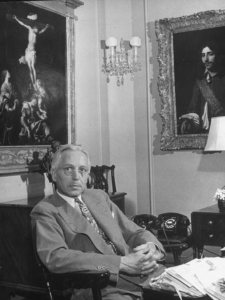
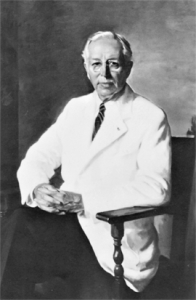
Louis Novy
INTERSTATE THEATRE CIRCUIT
That’s Louie with Vaudeville legend, Ted Lewis, who was famous for his “stovepipe” hat and the saying, “Is everybody ready? Called “Mr. Entertainment”, he was a famous bandleader in pre-1930’s “hot jazz” era.
Louis Novy managed Karl Hoblitzelle’s Interstate Theaters’ operations in Austin, which included the Paramount Theater, State Theater, Queen Theater, and Hancock Opera House during the early Vaudeville days of the late 1920’s, through the transformation of the theatres into movie houses, until his passing in 1958. Louie was one of President Lyndon Johnson’s closest friends. Charles Root (center) would eventually become city manager for Interstate Theatres until 1975.
Louis Novy was given the Silver Medal of Honor by the United States Treasury Department for raising $8.8 million between the years 1943-1945 for the War Bond Campaign of WWII. During that period, acts which graced the Paramount stage included Houdini, The Marx Brothers, Orson Welles, George M. Cohan, Helen Hayes, Lillian Gish, and the Ziegfeld Follies to name a few.
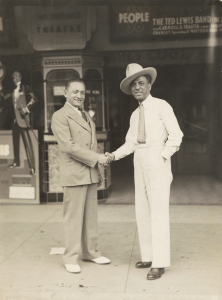
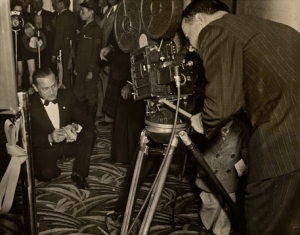
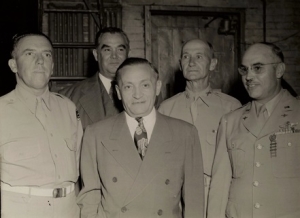
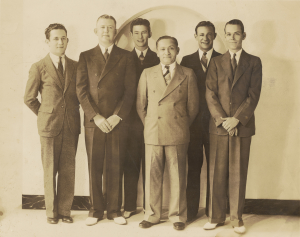
Charlie Root
Interstate Theatres – 1933 – 1975
Charlie Root, former city manager for Interstate Theatres in Austin, including the Paramount, was my first true supporter in 1971. I was 23 having just graduated from UT’s Radio, Television and Film Dept. The original idea for the Paramount came on a trip to LA which included a showing of “A Clockwork Orange” at the Pacifica Theatre. It was a magnificent theatre but I knew it was not just a movie house. Upon my return to Austin, I made a bee line to the Paramount to buy a ticket so I could sneak backstage to see if there was a stage house. No stage house – no live shows. Eureka! There was. I ran up the stairs to ask for the manager and was introduced to Charlie. I told him my idea to save, restore and rejuvenate the Paramount as a performing arts theatre. He lit up!
Charlie started at the Paramount as an usher at 19. He rose in the ranks to become manager of the then Queen Theatre on Congress. It saddened him, greatly, to see Interstate abandon the Paramount, letting it fall in to disrepair and resorting to showing Kung Fu movies with Bruce Lee. He introduced me to Bobbie Crenshaw and the other Paramount heirs, helped us with American Bank to lower the lease from $3,600/month to $1,500/month and was instrumental in the transition between Interstate leaving and our taking over on April 15, 2015, almost 40 years ago next month. Charlie once played “burn out” in the alley with Cab Calloway. He was a great guy, a friend, kind, supportive and a wonderful golfer with Daryl Royal, Wally Scott, Sr. and others. He had a wicked short game. If Charlie doesn’t take me in like family in the beginning, we might not have ever got off the ground. Thanks a million, Charlie Root!!! Kung Fu out…millions of fans served hundreds of the finest entertainments in the world. SHOW TIME!!
